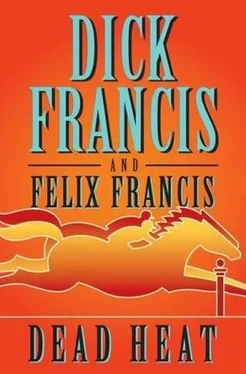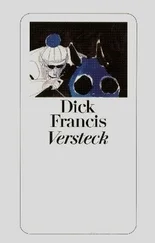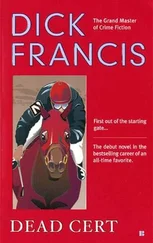I thought that if the blast could do such damage to concrete and steel, the occupants must have stood no chance.
Carnage was not too strong a word for the scene.
There had been thirty-three guests at lunch, two others having unexpectantly failed to appear, much to MaryLou’s frustration and displeasure. Then there were my two staff. So there must have been at least thirty-five people either in that room or on the balconies when the bomb exploded, not counting any people who may have been invited in to watch the race after lunch.
Most of them seemed to have disappeared altogether.
A whimper to my left had me scampering under the upturned tables to find the source.
MaryLou Fordham lay on her back close to the rear wall. I could only see her from the waist up, since she was half covered with a torn and rapidly reddening tablecloth. The blood that was soaking into the white starched cotton was an exact color match with her bright scarlet chiffon blouse that had fared rather badly and now hung as a tattered mass around her neck.
I knelt down beside her on my right knee and touched her forehead. Her eyes swiveled round in my direction. Big, wide, frightened brown eyes in a deathly pale face, a face cut and bleeding from numerous shards of flying glass.
“Help will be on the way,” I said to her, somewhat inadequately given the circumstances. “Just hang on.”
There was a lot of blood below her waist, so I lifted the tablecloth a little to see what damage had been done. It was not easy to see. There was not much light under the blood-soaked cloth, and there was a tangle of broken chairs and tables in the way. I shuffled down to get a better look and only then did my confused brain take in the true horror. Both of MaryLou’s lovely legs were gone. Blown away.
Oh my God, what do I do now?
I stupidly looked around me, as if I could find her missing legs and snap them back into place. Only then did I see the other victims. Those who had lost not only their legs and feet but arms and hands too, and their lives. I began to shake. I simply didn’t know what to do.
Suddenly, the room filled with voices and bustling people in black-and-yellow coats and big yellow helmets. The fire brigade had arrived. None too soon, I thought. I started to cry. It was unlike me to cry. My father had been one of the old school who believed that men shouldn’t. “Stop blubbing,” he would say to me when I was about ten. “Grow up, boy. Be a man. Men don’t cry.” And so I had been taught. I hadn’t cried when my father had been killed by the brick truck. I hadn’t even cried at his funeral. I knew that he wouldn’t have wanted me to.
But now the shock, the tiredness, the feeling of inadequacy and the relief that the cavalry had arrived was just too much, and so the tears streamed down my face.
“Come on, sir,” said one of the firemen into my ear as he held my shoulders, “let’s get you out of here. Are you in any pain?”
My tongue felt enormous in my mouth, stifling me. “No,” I croaked. “Well, my knee hurts a bit. But I’m fine…But she…” I pointed at MaryLou, unable to say anything further.
“Don’t worry, sir,” he said to me, “we’ll look after her.”
He helped me to my feet and turned my shoulders away. My gaze remained on where MaryLou’s legs should have been until the fireman turned me so far that my head just had to follow. He held me firmly and pushed me towards the door, where a second fireman put a bright red blanket over my shoulders and led me out. I wondered if they used red blankets so that the blood didn’t show.
The fireman guided me down the corridor towards the stairwell. I looked into the kitchen as we passed by. Carl was leaning over the sink, throwing up. I knew how he felt.
A man in a green jacket with DOCTOR written large across the back pushed past me. “Is he all right?” he asked my escort.
“Seems so,” was the reply.
I wanted to say that no, I wasn’t all right. I wanted to tell him that I had glimpsed an image of hell and that it would surely live with me forever. I wanted to shout out that I was far from all right and that I might never be all right again.
Instead, I allowed myself to be led to the stairwell, where I obeyed instructions to go down. I was assured that others would be waiting at the bottom to help me. But can they erase the memory? Can they give me back my innocence? Can they prevent the nightmares?
HAVING BEEN INSTRUCTED by the fireman, I obediently descended to ground level and, as promised, was met by helping hands and soothing voices. A brief assessment of my physical injuries left me, still wrapped in my red blanket, sitting on a row of white plastic chairs for what seemed like a very, very long time. Several times a young man in a bright green outfit with PARAMEDIC emblazoned in white letters across his shoulders came over to ask if I was OK. He said that they were sorry about the delay, but there were others in greater need. I nodded. I knew. I could still see them in my mind’s eye.
“I’m fine,” I said. But I didn’t really mean it.
Ambulances came and went, their sirens wailing, and a line of black body bags, laid out close to the back of the grandstand, grew longer as the afternoon sunlight slowly faded towards evening.
I was finally taken to the hospital about seven o’clock. After so long sitting in the plastic chair, I was unable to stand properly on my left leg since my knee had swollen up and stiffened badly. My young paramedic friend helped me to an ambulance that then sedately drove off with no siren or flashing lights. It was as if the urgency of the crisis was passed. Those seriously injured and dying had been whisked away at speed. Those already dead were beyond help. We, the almost-walking wounded, could now be cared for with composure and calm.
The ambulance took me all the way to Bedford, as the hospitals more local to Newmarket had been overwhelmed by the seriously injured. At Bedford, an X-ray revealed no fractures in my swollen left knee. A doctor speculated that the collision with the door may have caused a temporary dislocation of my patella-my kneecap-which had resulted in some internal bleeding. A hematoma had formed in the joint, causing both the swelling and the pain. The blood loss that had stained my trousers was found to be due to a tear of the soft tissue of my lower thigh, also probably a consequence of the collision with the door. Although the flow had all but stopped, the doctor insisted on applying some adhesive strips to close the edges of the wound, which he then covered with a large white rectangular bandage. No such care was afforded to my trousers, which were unceremoniously cut off short on the left side. The hospital provided me with a tight blue rubberized sleeve for my knee to both provide support for the joint and to apply pressure to the hematoma to reduce the bruising. They also thoughtfully equipped me with a long white, closely woven cotton sock to wear on my left foot to reduce swelling in the lower leg and a supply of large white painkillers. I would be fine, they said, after a few days’ rest. Fine in body, I thought, although it would take longer to heal the emotional injury.
A taxi was ordered to take me home. So I sat waiting in the hospital reception, somewhat embarrassed at having caused such a fuss and feeling guilty that I had escaped so lightly while others had not. I was utterly drained. I thought about Robert and Louisa, my staff. Had they survived? What should I do to find out? Who should I ask?
“Taxi for Mr. Moreton,” said a voice, bringing me back to the present.
“That’s me,” I replied.
I realized I had no money in my pockets.
“That’s all right, the National Health Service is paying,” said the driver. “But they don’t tip,” he added. He’s going to be unlucky, I thought, if he thinks he’s going to get a tip from me.
Читать дальше












